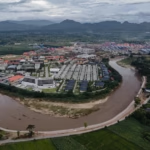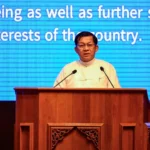As Myanmar’s Rakhine State transforms under the growing influence of the Arakan Army, Bangladesh stands at a pivotal crossroads. With the AA controlling over 80% of Rakhine, including the sensitive 271-km shared border, Dhaka faces rising challenges—cross-border crime, refugee spillovers, and national security threats. But alongside these risks lie opportunities. As regional giants like India and China open pragmatic channels with the AA, Bangladesh must also rethink its strategy to avoid diplomatic isolation and assert its interests through measured, strategic engagement.
In this latest analysis, Shamshil Arefin explores how a multi-pronged approach—grounded in theory, backed by precedent, and mindful of humanitarian and security realities—can help Bangladesh navigate this complex landscape. From leveraging Track II diplomacy to aligning humanitarian aid with strategic goals, the piece offers actionable policy directions that embrace realism without compromising on values. Read the full commentary to understand why Rakhine’s future is deeply intertwined with Bangladesh’s regional posture.
Thank you for reading! Visit us anytime at Myanmar.com for more insights and updates about Myanmar
Related posts:
 The rapid decline of the kyat is crippling consumers and businesses in Myanmar.
The rapid decline of the kyat is crippling consumers and businesses in Myanmar.
 Scam Factories on the Thai–Myanmar Border: How Chinese Mafia Networks Operate
Scam Factories on the Thai–Myanmar Border: How Chinese Mafia Networks Operate
 MYANMAR RED CROSS TEAMS UP WITH SINGAPORE AND NORWAY FOR EARTHQUAKE RELIEF EFFORTS
MYANMAR RED CROSS TEAMS UP WITH SINGAPORE AND NORWAY FOR EARTHQUAKE RELIEF EFFORTS
 RUSSIA, MYANMAR SIGN AGREEMENT ON PROMOTION, PROTECTION OF INVESTMENT
RUSSIA, MYANMAR SIGN AGREEMENT ON PROMOTION, PROTECTION OF INVESTMENT
 Myanmar Junta Admits Polls Can’t Cover Entire Country
Myanmar Junta Admits Polls Can’t Cover Entire Country
 FROM CONFLICT TO COMMERCE: REBUILDING MYANMAR’S ECONOMY
FROM CONFLICT TO COMMERCE: REBUILDING MYANMAR’S ECONOMY
